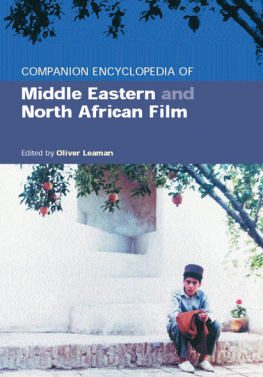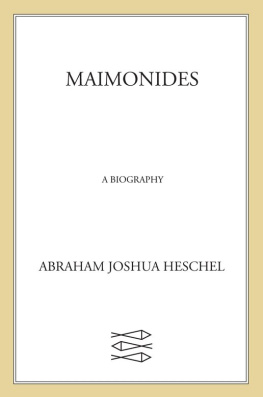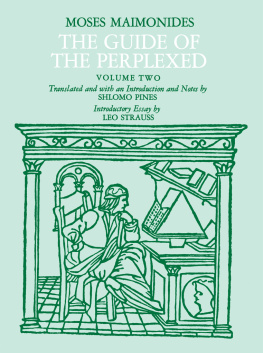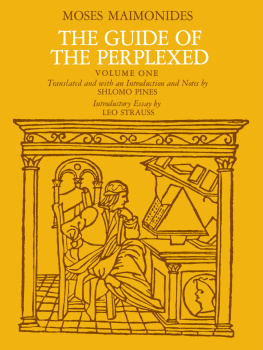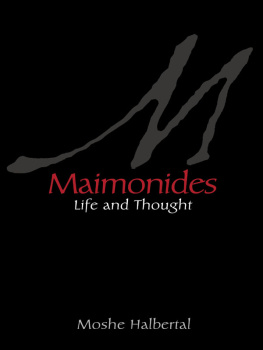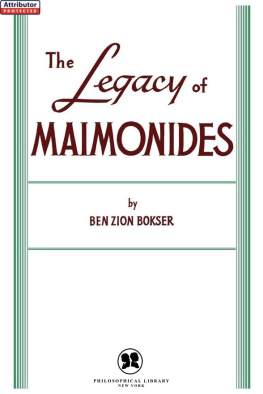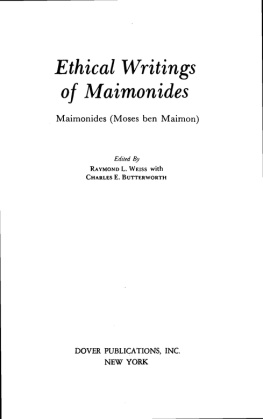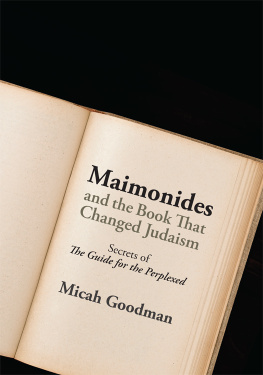MOSES MAIMONIDES
Curzon Jewish Philosophy Series
Series Editor: Oliver Leaman
Liverpool John Moores University
It is the aim of this series to publish books and collections of essays in the general area of Jewish philosophy. A broad interpretation will be taken of what Jewish philosophy comprises, and the series will be interested in receiving proposals which involve a philosophical treatment of a Jewish thinker or topic, or which look at some aspect of Jewish cultural life from a philosophical perspective.
MEDIEVAL JEWISH PHILOSOPHY
An Introduction
Dan Cohn-Sherbok
FACING THE OTHER
The Ethics of Emmanuel Levinas
Edited by Sen Hand
Moses Maimonides
Oliver Leaman
First published 1990 by Curzan Press
Published 2013 by Routledge
2 Park Square, Milton Park, Abingdon, Oxon OX14 4RN
711 Third Avenue, New York, NY 10017 USA
Routledge is an imprint of the Taylor & Francis Group, an informa business
1990 Oliver Leaman
All rights reserved. No part of this book may be reprinted or reproduced or utilised in any form or by any electronic, mechanical, or other means, now known or hereafter invented, including photocopying and recording, or in any information storage or retrieval system, without permission in writing from the publishers.
British Library Cataloguing in Publication Data
A catalogue record for this book is available from the British Library
Library Cataloguing in Publication Data
A catalogue record for this book has been requested
ISBN 978-0-7007-0676-1
ISBN 978-1-3150-2706-7 (eISBN)
For Rosa, Imogen, and Perdita
Contents
There are many books and articles which deal with aspects of Maimonides and his thought, and any author requires a good reason for adding to what already exists. In this book I argue that there is a need for a re-examination of the traditional interpretation of the philosophical thought of Moses Maimonides. That interpretation is based upon two principles, both of which are suspect. The first principle is that Maimonides set about a strategy of hiding his real opinions beneath a disguise of careful and conflicting language, which alerted his supporters to his genuine views while pacifying the suspicions of those incapable of understanding or appreciating his real message. It will come as no surprise to those who have come across some of my work in the area of medieval philosophy that I oppose this approach to Maimonides. Such a process of interpretation falls neatly within the orientalist mode of analysis, which continually looks for a hidden and more significant meaning beneath the text itself, based as it is upon a subtle rejection of the value of the text as a philosophical argument. On the contrary, I argue here that Maimonides presents powerful and intriguing arguments which deserve serious philosophical consideration, raising as they do issues concerning the appropriate analysis of language and the notion of a human point of view. It is a great shame that the extreme care which Maimonides took over his means of presentation has been distorted by the orientalists to represent a linguistic device to disguise his argument, whereas in reality he was trying to present the argument in as clear and terse a form as possible. One of the results of the influence of the traditional interpretation of Maimonides is the proliferation of extraordinarily 'scholarly' articles on his work, with a text almost submerged under footnotes and respectful references to other commentators. Although there is interesting material in much of this work, it often succeeds in treating as a sideline the actual argument which Maimonides produces. In this book the emphasis throughout is upon the arguments themselves.
The second principle which will be challenged here is that Maimonides is a specifically Jewish thinker. The majority of the literature dealing with his thought tries to relate his philosophical and legal work, with the emphasis upon the reconciliation of Aristotelian philosophy and Jewish religious principles. This is an interesting topic, and was obviously of concern to Maimonides, but it is a great error to see his philosophical ambitions as being limited to this issue. Maimonides was Jewish, and a leader of his community both while alive and even today through his persisting thoughts as represented in his work. Judaism was the context within which he worked, but of far more importance when we come to his philosophy is the influence of the tradition of philosophy in the Islamic world. In this book he is treated as a member of the distinguished group of thinkers in the Islamic world who took on board the methodology of Aristotle and applied it to difficult conceptual issues in interesting and perceptive ways. The main focus is on his Guide of the Perplexed and some of the main philosophical concerns he has in that work. There is no attempt here at providing a comprehensive guide to Maimonides' philosophical thought, but something of the flavour of his approach to important philosophical issues. Philosophy is a pursuit with universal aspirations (hence the opposition by particular religious institutions) and it is misleading to think of Maimonides as a specifically Jewish philosopher. On the other hand, when we consider the breadth and depth of his work we are at the same time celebrating the richness of the cultural milieu which the Islamic world constituted at that period of history.
Many people and institutions have helped me with this book. Libraries in a variety of places have been of great assistance, as has my college library. The British Academy kindly assisted financially some of my work on Maimonides' use of the notion of imagination. A version of the chapter on imagination appears in Religion (1988) 18, pp. 69-80, and was presented as a paper at the University of Cambridge 850th Anniversary Maimonides Lecture Series in 1985. I have presented part of the book as papers on a number of occasions at the Universities of Exeter, Liverpool and Wales, and am grateful for the comments by participants. Dr Erwin Rosenthal has yet again proved to be immensely stimulating during the course of our discussions on Maimonides, and I am profoundly grateful to him. I have enjoyed and learnt a good deal from the discussions I have had with Peter Edwards on more general philosophical topics My thanks go to them both. They are in no way responsible for any errors which exist in the text.
Liverpool,
June 1988
O. N. H. L.
It is interesting to speculate on what a book on the philosophy of Moses Maimonides ought to include. He is such a multifaceted character, with major contributions to thought completely outside of philosophy, and also a thinker who plays a crucial role within Judaism itself. At the time he was working, the role of philosophy itself was highly controversial, and his work was met with great hostility in much of the Jewish world. He had available to him a wide variety of philosophical traditions in which to work. Some of the issues with which he was concerned seem rather dated now, especially when they are part of the complex ontology of Neoplatonism, and we are certainly today far less excited about the apparent clash between Aristotelianism and monotheistic religion. There is also the problem, which has been raised to the status of a dogma by many interpreters of Maimonides, that he talks about hiding one's real views in the language one uses to prevent the unsympathetic from comprehending precisely what the argument is. All these factors seem to imply that the study of Maimonides is going to be an historical investigation into an interesting but archaic set of concepts and arguments.




